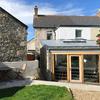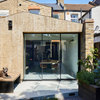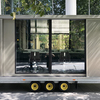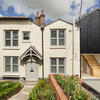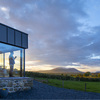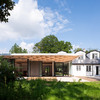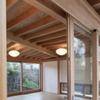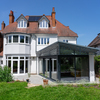The Jewelery Box House
Subscribe now to instantly view this image
Subscribe to the Architects’ Journal (AJ) for instant access to the AJ Buildings Library, an online database of nearly 2,000 exemplar buildings in photographs, plans, elevations and details.
Already a subscriber? Sign in
michaelcollins-hernehill-cjacobmilligan-0091
The property is situated within a Victorian terrace backing onto the railway embankment from which the street takes it name
The terrace was constructed at the latter part of the 19th Century. Like many similar terraces, the street side is defined by a tall uniform elevation of London stock, punctuated only by a rhythm of bay windows and recessed porches. At the rear however an eclectic range of incremental additions and forms is testament to the varied lives of its inhabitants over the years.
The language of the new extension was inspired by the honesty and simply poetry of self-built 'add-ons' and 'closet returns' seen along the rear of railway terraces. Key challenges involved the extensive refurbishment of the existing property which was in a poor state of repair, and create the sense of a sequence between the various spaces.
A key issue involved how to maximise the sense of external space, and create a new kitchen space to utilise the aspect at the rear over the tall planted embankment to the railway. The clients, Ian and Clare, had a large collection of fine furniture and an ambition about how each space within the existing property and the new extension could have their own identity.
A 'jewellery box' was used as a metaphor to describe how a structure that was seemingly small from the outside; could unfold into a varied array of spaces when one progresses through the building. A dark and apparently simple exterior form would have a warm and eclectic interior. The intimate character of the existing property is retained whilst creating a light and tall proportioned new space to the rear.
The extension to the rear is conceived as two cubic volumes embedded within a plinth. The lowered plinth along the boundaries contains the kitchen cupboards and units, and avoids overshadowing issues to neighbouring properties. One volume creates a tall central 'lantern' over the dining area and is detached from the rear of the property to allow light to enter from all sides. The second volume, a timber clad bathroom rests above the roof structure and defines a space for a large roof-light below.
The tall dining space directs views up into the tree canopy of the embankment. A large pocket door completely opens the new kitchen to the garden area. The first floor bathroom and bedrooms, look over a new green roof to the plinth to provide visual continuity with the embankment behind. A warm and rich timber lined interior with flecks of brass contrast with the existing victorian brickwork, complemented with sharply detailed darkened metal and charred timber exterior of the new extension.
The external materials to the new extension were chosen to blend with the sooty coloured London stock brickwork at the rear, and speak to the oxidised qualities of small structures along the railway line itself.
Photography by Michael Collins, Jacob Milligan
Data
- Begun: May 2018
- Completed: Sep 2019
- Floor area: 95m2
- Sector: Residential
- Total cost: £160,000
- Funding: Private
- Tender date: Apr 2018
- Procurement: Traditional combined with client management contracting
- Address: Herne Hill, London, SE24, United Kingdom
Professional Team 
- Architect: Michael Collins Architect LLP
- Client: Ian Harding and Clare Checkland
- Structural engineer: Osborne Edwards Ltd
- Planning supervisor: Michael Collins Architect LLP
- Main contractor: Ecron ltd
Suppliers
- Selected subcontractors and suppliers: Shueco Aurubis Copper Bauder green roof Ian Dunn Kitchens Sho Shugi Ban












